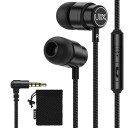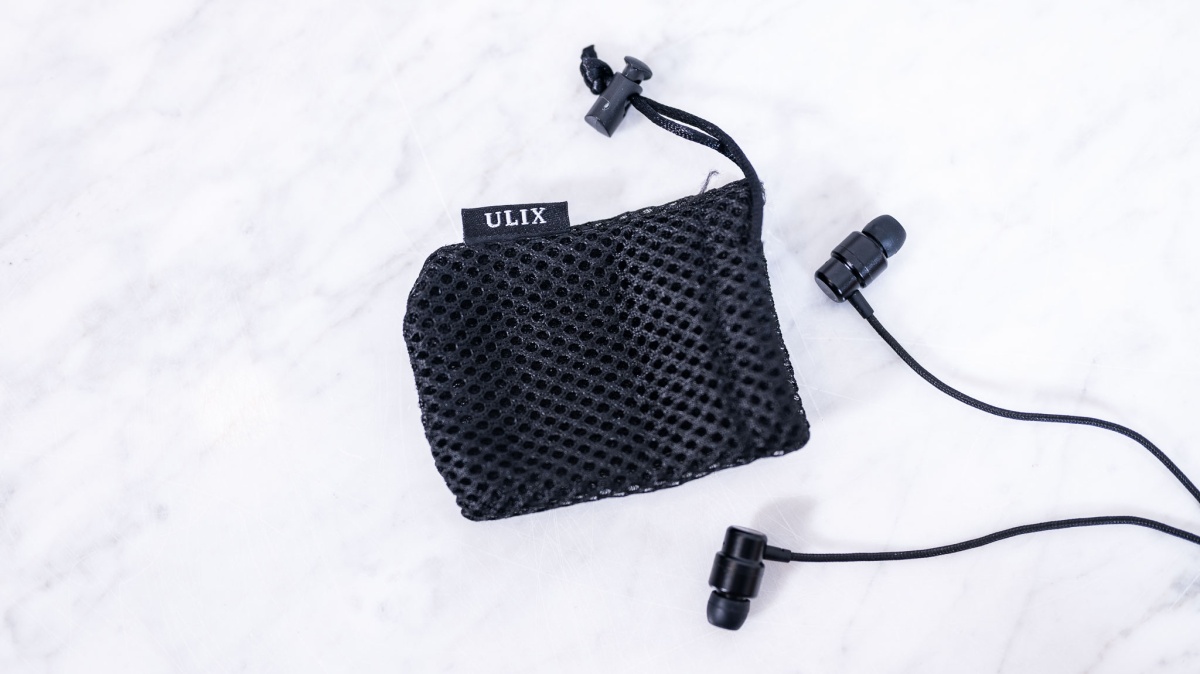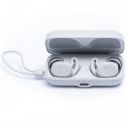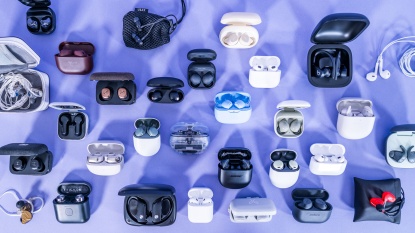Our Verdict
Compare to Similar Products
 This Product UliX Rider - 3.5mm | |||||
|---|---|---|---|---|---|
| Awards | Best Wired Earbud | Bargain Bin Alert - Great Exercise Buds | Bargain Bin Alert! Watch for Low Prices | Best Budget Wireless Earbuds | Best Wireless Earbuds on a Tight Budget |
| Price | $18.00 List $17.97 at Amazon | $200 List $163.00 at Amazon | $230 List $99.99 at Amazon | $150 List $89.99 at Amazon | $50 List $24.99 at Amazon |
Overall Score  |
|||||
| Star Rating | |||||
| Bottom Line | Forgoing flash for a great fit and impressive sound at a great price, these wired earbuds are hard to argue with | Long lasting battery life, impressive water resistance, comfort, and great sound quality make these an easy choice | These are comfortable with reasonable audio quality at a lower price point than most | These buds offer an impressive soundstage and sturdy construction — if they fit | If you don't need noise cancelation or top-notch audio, these are a good deal |
| Rating Categories | UliX Rider - 3.5mm | Jabra Elite 8 Active | Samsung Galaxy Buds... | Jaybird Vista 2 | Amazon Echo Buds |
| Sound Quality (40%) | |||||
| User Experience (20%) | |||||
| Noise Cancellation (15%) | |||||
| Battery life (15%) | |||||
| Call Quality (10%) | |||||
| Specs | UliX Rider - 3.5mm | Jabra Elite 8 Active | Samsung Galaxy Buds... | Jaybird Vista 2 | Amazon Echo Buds |
| Active Noise Cancelling | No | Yes | Yes | Yes | No |
| Earbud Location Tracking | No | Yes | Yes | Yes | Yes |
| Measured Battery Life | N/A | 11.9 hr | 7.5 hr | 6.3 hr | 5.9 hr |
| Waterproofing | N/A | IP68 | IPX7 | IP68 | IPX2 |
| Measured Weight | 0.62 oz | 0.18 oz | 0.19 oz | 0.24 oz | 0.18 oz |
| Quick Charging | N/A | 5 mins = 1 hr | 5 mins = 1 hr | 5 mins = 1 hr | 15 mins = 2 hrs |
| Charges Per Case | N/A | 3 | 3 | 2 | 3 |
| Wired Charging Port | 3.5mm jack | USB-C | USB-C | USB-C | USB-C |
| Wireless Charging Option | No | Yes | Yes | Yes | No |
| Claimed Battery Life | N/A | 14 hrs | 8 hrs | 8 hrs | 5 hrs |
| Charging Carrying Case | N/A | Yes | Yes | Yes | Yes |
| Transparency Mode | No | No | Yes | Yes | No |
| Multipoint | No | Yes | No | No | No |
| In-ear Detection | No | Yes | Yes | Yes | Yes |
| Multiple Ear Tips | Yes | Yes | Yes | Yes | Yes |
Our Analysis and Test Results
The Rider earbuds are a simple, wired option focused solely on delivering excellent audio quality. Despite their old-school appearance and feel, they provide one of our favorite neutral soundscapes, letting your favorite songs shine just as the artists intended.
Performance Comparison
Sound Quality
Okay, we're impressed. These unassuming, old-school, wired earbuds sound amazing. The equalization (EQ) mix is nearly perfect, balancing all frequencies to create a neutral profile that lets your music shine, regardless of genre. This balance ensures that tracks don't sound overly sculpted or forced into a specific sonic profile. Tracks like the trap-influenced “Bankroll” by Nic D & Connor Price or straight hip-hop like “In This House” (featuring Gucci Mane) by Lil Wayne sound natural and authentic.
The only issue we foresee with the Rider earbuds' sound quality is for listeners who prefer exaggerated basslines. The lower frequencies are powerful but balanced and natural, maintaining quality across all levels without overwhelming other frequencies. Unfortunately, there's no EQ adjustment to boost the bass for a bass-heavy workout or dance session.
The bass is punchy and warm, making it suitable for a wide range of genres, from classical and jazz to metal, EDM, and rap. We have a blast dancing around to hip-hop bops like “Big Booty” by Gucci Mane (featuring Megan Thee Stallion), “Violet” by Connor Price and Killa, and “Spinnin” by Connor Price and Bens.
The mid-frequencies are full and clear, with natural sound reproduction for the most part. High-mids can sound elevated in the mix at times and occasionally distorted at higher volumes. The low-mids are amazing though, with a super warm and power sound signature. Centered songs like “Billie Bossa Nova” by Billie Eilish sound fantastic.
The treble range is crisp and strong yet balanced in the mix. At high volumes, it can become brassy, but at normal levels, it remains nuanced and full. Abby Webster's high twang sounds superb in “Tall Boy” and the bright high notes pop in “Sunny” (featuring Connor Price) by Boney M.
Wired earbuds usually offer more power than their Bluetooth counterparts, and these are no exception. While the maximum volume is impractically high and clarity diminishes at the top levels, the sound quality carries when they're loud, but not when they're cranked all the way to the top volume.
Soundstage
It's hard to imagine small, in-ear speakers replicating a live music experience, where the instruments surround you, creating an immersive experience. With technological improvements though, earbuds are getting better at taking the music out from between your ears and (seemingly) into the world around you. The term used to describe where the music seems to originate in space is known as the soundstage.
The brilliant sound profile of these earbuds creates depth and range with clearly identifiable bass, mid, and treble layers in the profile. The result is an expansive soundscape that even the choosiest audiophiles are likely to enjoy. Their excellent clarity evokes a wide open space rather than sounding dense and packed in, like it's all in your head. This broad, expansive soundstage makes these earbuds a lot of fun to listen to.
The Rider earbuds' frequency response curve above shows the relative sound levels of the bass, mid, and treble ranges. It's joined by the GearLab House Curve, which is the ideal frequency response curve for earbuds, in our opinion.
The results are somewhat surprising. While the bass isn't the most powerful in the test, it shows it cranked up in the chart, suggesting it might overpower other segments of the soundscape. However, we couldn't be more elated by the depth and range these buds provide. The mid and treble frequencies are even more differentiated, rising and dipping at different rates and frequencies, but we can reassure you that both sound pleasing to our ears. This result illustrates the importance of testing the earbuds both in the lab and in real-world scenarios.
User Experience
It doesn't get much easier than this. To use these earbuds, simply plug them into your device, slide them into your ears, and go. There's no app to worry about and no batteries to charge. In a world of increasingly complex tech, this straightforward approach is refreshing.
Comfort
Of all the wired earbuds we've tested, these are the easiest to place in your ear. With no wings or over-the-ear attachments, you can have them in place in seconds. They come with three silicone covers to help you find the right fit, and all our testers found an acceptable setup. Once in place, they're quite comfortable, fading into the background nicely. We can easily wear them for over an hour at a time.
What we can't ignore are the two chords dangling from your face. Since we wear wireless earbuds more often these days, we noticed how easy it is to twist them up in your clothes. These cords are unique, feeling more like strings than traditional wires and tangling a bit more easily.
Stability
Despite their simple design, these earbuds stay put. As long as we mind the wires, they stay put when we're on the go. Still, we don't love to wear them on active days filled with bike riding, rock climbing, or running — wireless buds have ruined us. We couldn't find any information on their water resistance, so it's best to avoid sweat and rain splashes.
Customization
Wireless, Bluetooth-enabled earbuds usually require an app to operate, offering greater control over your listening experience, including the ability to manually equalize (EQ) the mix. These earbuds don't give you that kind of control.
That said, the mix is so masterful that we wouldn't touch the controls even if we had them. These earbuds are compatible with Apple and Android devices, and adapters allow you to access your phone, even if without an audio jack. The microphone hanging on the left wire doubles as a remote control, enabling you to answer calls and pause or play music.
Noise Cancellation
These earbuds have a singular focus — play music. They don't offer much else, including active noise cancellation (ANC) to block out low, droning sounds like engines or heating systems. While they do physically block some noise, they are not the top performers in this category.
The main advantage of ANC is its ability to block distractions, allowing you to immerse yourself in music, focus in a noisy office, or relax on a plane. These earbuds just don't offer that service. If you need it, you should look elsewhere.
Their passive noise isolation is also subpar, as demonstrated in the video above. They help to subdue the clacks of the plates, but it doesn't provide much else in the way of a barrier to the chaotic cafe.
Aside from testing these earbuds in noisy environments ourselves, we also used the high tech SoundCheck sound-measuring software to objectively judge how much noise they block. As you can see above, the data mimics what we hear during our daily lives with these buds. The results shown in the chart above are not impressive. The Riders only block 15 decibels or less of frequencies well above 1,000 Herz. Few other options performed this poorly.
Battery Life
Yes, wires can be annoying, but so is constantly charging your devices. As long as they're plugged into your phone or computer, they're always ready to use, earning them top scores in this category.
You also don't have to worry about depleting the battery with high volume levels, which is a significant concern with wireless earbuds. On the downside, new smartphones no longer offer a headphone jack as a matter of course. Luckily, there are usually adapters that serve as a work around.
Call Quality
Wired earbuds have been around for a while, leading to effective designs. This seems to be the case with the Ulix Rider earbud's ability to isolate your voice from surrounding sounds. These earbuds excel at transmitting clear phone calls, regardless of your environment.
To further test this metric, we played sound copies of a male and female voice through a speaker. We played them in a quiet room, with light office noise, and with a loud Subway in the background. They performed well in every circumstance.
These handled the Subway situation gracefully, cancelling just enough ambient noise to be understood. The video clip above may not sound impressive, but trust us, it's far better than most.
With light office noise, a bit of background buzz is audible, but the voices remain clear and understandable in the video above.
Both the male and female voices are clear and easy to hear through the microphone in a quiet room, as demonstrated in the audio above.
Should You Buy the Ulix Rider?
If you want near top-of-the-line sound quality at one of the lowest price points we've seen, we think you'll love these earbuds.
| Overall Scores (1-100) | MSRP | Star Value | |
|---|---|---|---|
| Linsoul KZ ZSN Pro X | 69 | $22 | |
| UliX Rider - 3.5mm | 70 | $18 | |
| Sony WF-1000XM5 | 70 | $250 | |
| Sennheiser Momentum TW4 | 71 | $300 |
Their main downsides are the wires, lack of active noise cancellation, and minimal ambient sound blocking. All told, if you don't mind the wires, the incredibly low-cost barrier makes the Rider earbuds a great entry point into the mobile audio world. They also make excellent backups for when your wireless options run out of battery.
What Other Earbuds Should You Consider?
The Linsoul KZ ZSN Pro X earbuds don't match the Ulix Rider in sound quality, but they offer better noise isolation and slightly superior call quality for phone calls at a similar price. For those seeking wired earbuds to use as in-ear stage monitors, the Sennheiser IE 100 Pro earbuds are our top pick due to their lightweight, breathable fit. If you prefer a wireless experience, the Beats Studio Buds + earbuds offer a good value, though they are a step down in sound quality and a significant step up in price. For truly booming bass and enhanced sound, the Bose QuietComfort Ultra is an excellent choice, albeit at a higher cost.



















